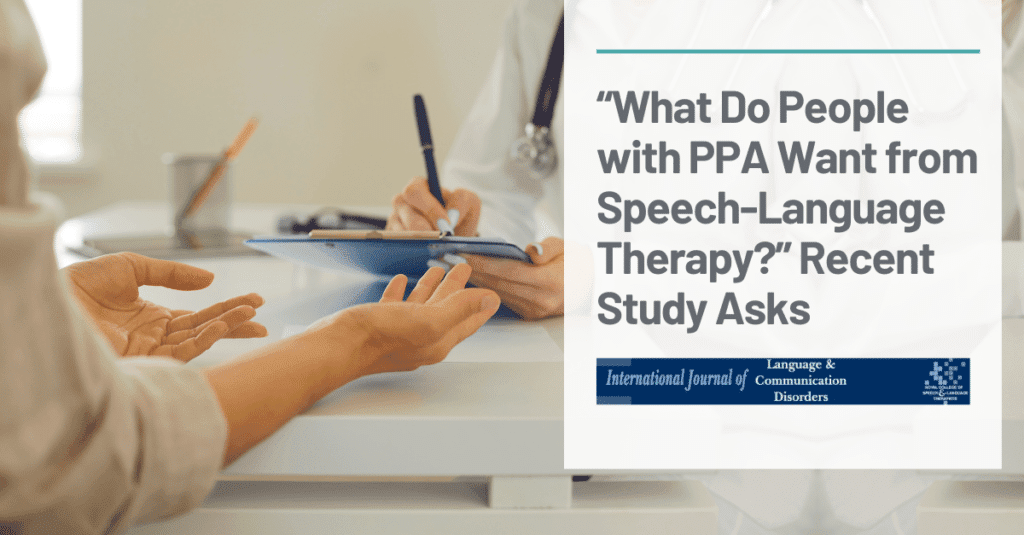“What Do People with PPA Want from Speech-Language Therapy?” Recent Study Asks

A study published in the International Journal of Language and Communication Disorders explores the needs of people affected by primary progressive aphasia (PPA) and how speech-language therapy (SLT) can be better tailored to help them.
While there are currently no approved disease-modifying treatments for PPA, the study highlights how non-medicinal approaches like SLT can make a considerable difference in the lives of people living with the disease. Researchers note that while there is an increasing number of studies evaluating communication interventions for PPA, only a handful integrate the experiences of people with PPA themselves. The researchers hoped to address this lack of inclusion through their own study.
Seven people with different forms of PPA and 14 “communication partners” (care partners or people living with someone with PPA) were enrolled to participate in study groups conducted by the researchers. The participants were organized into four groups, one for each of the three PPA subtypes (nonfluent/agrammatic, semantic, and logopenic), with a single mixed group. The conversations were guided by the research question, “What speech and language therapy would be most useful to you?”
The participants in the focus group provided researchers with several crucial findings about the effectiveness of SLT, such as:
- Group sessions were noted to be beneficial for people with PPA. Due to variability in symptoms, however, it is uncommon for two people with the disease to have the exact same problems, making it a challenge to share advice at times.
- While exercises to strengthen language skills were beneficial for people with PPA, participants tended to say they weren’t particularly enjoyable. Despite their discontent, though, they continued training exercises for the benefits they provided.
- Creating and practicing scripted phrases to use in public is a common practice recommended in SLT, though participants reported varying levels of success in using them. While scripts can help start a conversation, deviations from the script (such as unexpected responses that the script does not account for) could cause confusion and make continuing difficult.
- SLT can be difficult for people with PPA to obtain, especially if they are in a rural community without access to the same care centers as those in more densely populated areas.
One of the more crucial findings of the study is a greater need for a person-centered approach to SLT, due to the high variability in symptomology between people with PPA. Researchers highlighted how there are often obstacles beyond communication for people with PPA, with factors such as age-related hearing loss or pre-existing conditions like dyslexia contributing substantially to PPA-related difficulties.
The personality and preferences of someone with PPA are also important to consider when approaching treatment for PPA symptoms. One’s inclination towards technology, for example, should be considered when determining whether to use a traditional or digital approach for SLT. Participants also noted that SLT was extremely valuable when centered around activities that people with PPA continue to enjoy, such as favorite hobbies.
The study also reinforced the greater need for training communication partners. The authors noted that previous studies have shown that educating partners as part of SLT intervention improved the communication confidence in both the partner and the person with PPA. Education would be especially helpful in situations where someone has overlapping neurodegenerative conditions and experiences both behavioral- and communication-based symptoms, such as a case of comorbid PPA and bvFTD.
Click here to learn more about primary progressive aphasia (PPA).
Interested in reading more about FTD research? Click here to read about a USC-led study that identified potential drug targets and drug candidates for treating ALS.
By Category
Our Newsletters
Stay Informed
Sign up now and stay on top of the latest with our newsletter, event alerts, and more…
